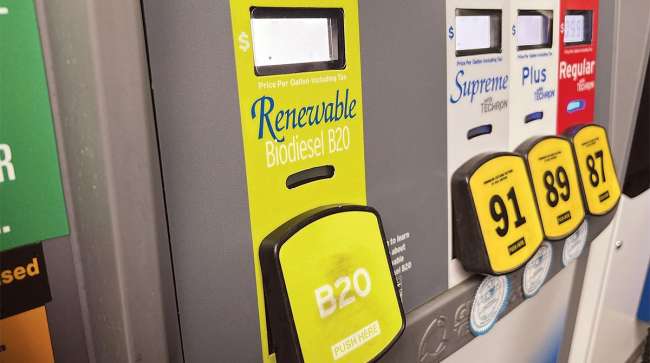Senior Reporter
ATRI Study Touts Renewable Diesel’s Benefits

[Stay on top of transportation news: Get TTNews in your inbox.]
There are operational and environmental gains to be realized for fleets that favor renewable diesel fuel over battery-electric vehicles, according to a new study by the American Transportation Research Institute.
Along with cost savings tied to infrastructure and vehicle purchase price, the report contends that there also are significant negative environmental impacts at play when trucks already using renewable diesel convert to battery-electric.
The ATRI study, “Renewable Diesel — A Catalyst for Decarbonization,” was made public on April 23.
While ATRI has estimated that a transition to battery-electric vehicles for longhaul trucking will cost over $1 trillion in electric infrastructure and vehicle purchase costs over 15 years, it sees expanded use of renewable diesel as a far more affordable and speedier way forward.
“To achieve similar CO2 benefits [to BEVs] with renewable diesel, ATRI estimates a price tag of $203 billion, a significant cost savings for achieving the same environmental benefits,” the study concluded. “Since renewable diesel is considerably more scalable than battery-electric vehicles and can be deployed immediately in trucks without modifications, it is likely that CO2 benefits using RD can be achieved on a much shorter timeline than with a BEV transition.”

Murray
ATRI Senior Vice President Dan Murray said the study is significant in that it supports the notion that battery-electric trucks are not truly ready for prime time. He notes that EVs are not as affordable as current diesel trucks that can use cheaper renewable fuel. Plus, he stressed that the environmental aspects of battery production should not be overlooked.
“We have a tendency in this country to ignore carbon produced by the manufacturing of batteries, the mining of elements, the disposal of vehicles at the end of their life,” Murray said in an interview. “So when you look at the full life cycle of a battery-electric truck versus a renewable diesel truck, you find out that the renewable diesel truck is twice as clean as battery-electric. I can take any truck on the road today and fill it up entirely with renewable diesel and then hit the road, and it’s substantially cheaper and it’s ultimately cleaner in terms of the life cycle.”
“My company quickly and successfully transitioned to renewable diesel in April of last year,” said Andy Owens, CEO and manager of A&M Transport of Glendale, Ore., also a member of ATRI’s Research Advisory Committee. “ATRI’s research offers concrete evidence that this move is better for the environment and easier to achieve than other low-carbon options.”
The new ATRI study follows two prior related studies.
In May 2022, ATRI published research that compared the life-cycle carbon dioxide emissions of petroleum diesel-fueled trucks to alternative fueled trucks. ATRI’s analysis measured CO2 emission decreases that could be achieved through the use of alternative energy sources. The findings of that study included a potential 30% decrease in life cycle CO2 per truck through the use of battery-electric vehicle trucks and a 67.3% decrease through the use of renewable diesel in then-existing Class 8 trucks.
The second ATRI study, published in December of that year, looked at the technical and electric infrastructure-related challenges of shifting to battery-electric trucks. The report identified substantial barriers to implementation, including:
- Insufficient electricity generation, transmission and distribution in the U.S.
- The need for a widely accessible truck charging network
- Complications related to the mining and processing of battery materials
Renewable diesel, the study said, is a fuel that is produced to be “chemically identical” to petroleum diesel; thus, RD can be mixed with petroleum diesel in any amount or used as a stand-alone, drop-in fuel in a traditional diesel truck without consequences.
There are several methods for producing renewable diesel, with the most common being hydrotreating. In the hydrotreating process, lipids from feedstocks of vegetable or animal products or waste are reacted with hydrogen under high temperature and pressure to remove water and oxygen.
Want more news? Listen to today's daily briefing above or go here for more info
“This is low-hanging fruit, both economically and environmentally for this industry,” ATRI’s Murray said. “We need to give it some due attention, rather than presuming that battery-electric trucks from five to 10 years from now will save the planet. We can put renewable diesel in trucks today and get a jump-start on environmental benefits.”
During an April 10 presentation from the truck maker’s hometown of Gothenburg, Sweden, Volvo Trucks Director of Environment and Innovation Lars Martensson touted the economic benefits of expanding use of renewable diesel, as the waste oil used as a source is less expensive than vegetable oils that are used for food.
“Renewable diesel is growing because it can be used in today’s diesels and can be produced from various waste sources,” he said in a media presentation. “Biofuel is falling off in favor of renewable diesel. It’s the food versus fuel debate. We want to grow the energy that comes from the renewable sources.”




